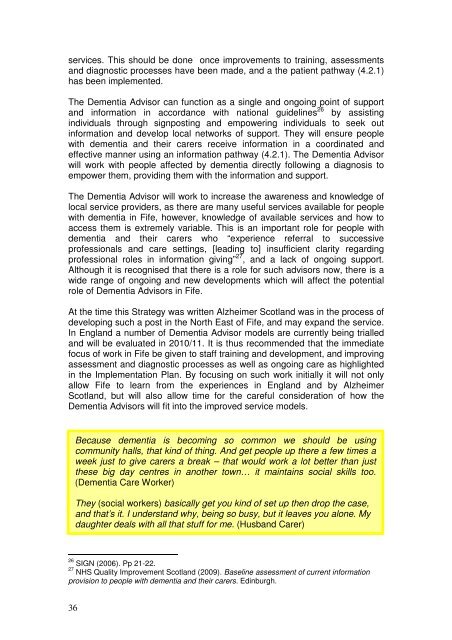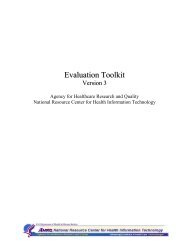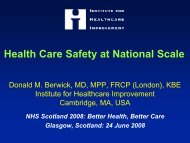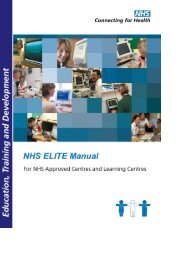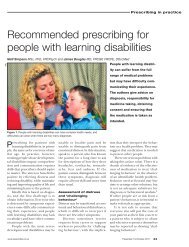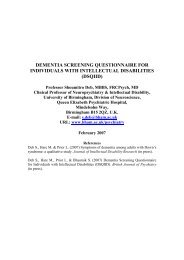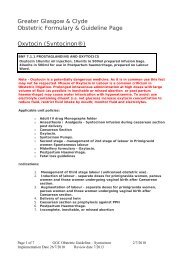The Fife Dementia Strategy: 2010 â 2020 - The Knowledge Network
The Fife Dementia Strategy: 2010 â 2020 - The Knowledge Network
The Fife Dementia Strategy: 2010 â 2020 - The Knowledge Network
You also want an ePaper? Increase the reach of your titles
YUMPU automatically turns print PDFs into web optimized ePapers that Google loves.
services. This should be done once improvements to training, assessments<br />
and diagnostic processes have been made, and a the patient pathway (4.2.1)<br />
has been implemented.<br />
<strong>The</strong> <strong>Dementia</strong> Advisor can function as a single and ongoing point of support<br />
and information in accordance with national guidelines 26 by assisting<br />
individuals through signposting and empowering individuals to seek out<br />
information and develop local networks of support. <strong>The</strong>y will ensure people<br />
with dementia and their carers receive information in a coordinated and<br />
effective manner using an information pathway (4.2.1). <strong>The</strong> <strong>Dementia</strong> Advisor<br />
will work with people affected by dementia directly following a diagnosis to<br />
empower them, providing them with the information and support.<br />
<strong>The</strong> <strong>Dementia</strong> Advisor will work to increase the awareness and knowledge of<br />
local service providers, as there are many useful services available for people<br />
with dementia in <strong>Fife</strong>, however, knowledge of available services and how to<br />
access them is extremely variable. This is an important role for people with<br />
dementia and their carers who “experience referral to successive<br />
professionals and care settings, [leading to] insufficient clarity regarding<br />
professional roles in information giving” 27 , and a lack of ongoing support.<br />
Although it is recognised that there is a role for such advisors now, there is a<br />
wide range of ongoing and new developments which will affect the potential<br />
role of <strong>Dementia</strong> Advisors in <strong>Fife</strong>.<br />
At the time this <strong>Strategy</strong> was written Alzheimer Scotland was in the process of<br />
developing such a post in the North East of <strong>Fife</strong>, and may expand the service.<br />
In England a number of <strong>Dementia</strong> Advisor models are currently being trialled<br />
and will be evaluated in <strong>2010</strong>/11. It is thus recommended that the immediate<br />
focus of work in <strong>Fife</strong> be given to staff training and development, and improving<br />
assessment and diagnostic processes as well as ongoing care as highlighted<br />
in the Implementation Plan. By focusing on such work initially it will not only<br />
allow <strong>Fife</strong> to learn from the experiences in England and by Alzheimer<br />
Scotland, but will also allow time for the careful consideration of how the<br />
<strong>Dementia</strong> Advisors will fit into the improved service models.<br />
Because dementia is becoming so common we should be using<br />
community halls, that kind of thing. And get people up there a few times a<br />
week just to give carers a break – that would work a lot better than just<br />
these big day centres in another town… it maintains social skills too.<br />
(<strong>Dementia</strong> Care Worker)<br />
<strong>The</strong>y (social workers) basically get you kind of set up then drop the case,<br />
and that’s it. I understand why, being so busy, but it leaves you alone. My<br />
daughter deals with all that stuff for me. (Husband Carer)<br />
26 SIGN (2006). Pp 21-22.<br />
27 NHS Quality Improvement Scotland (2009). Baseline assessment of current information<br />
provision to people with dementia and their carers. Edinburgh.<br />
36


